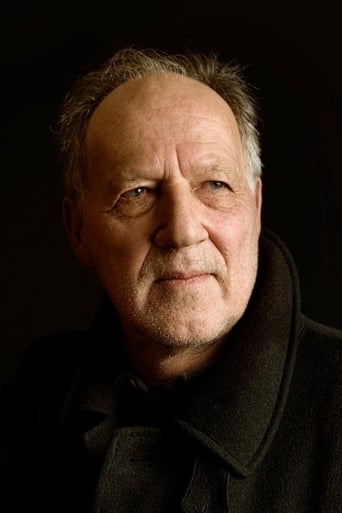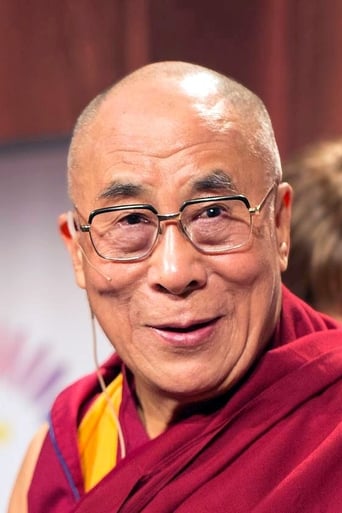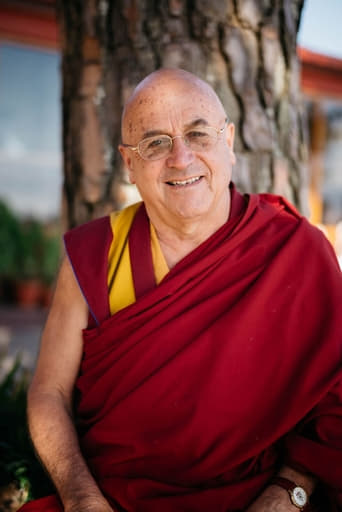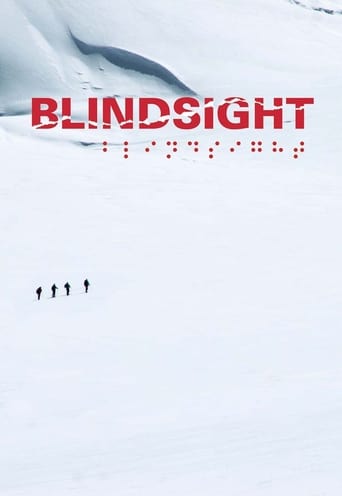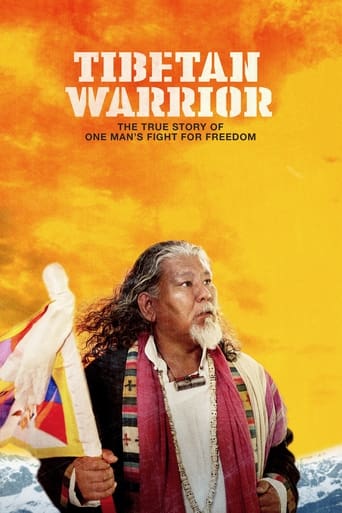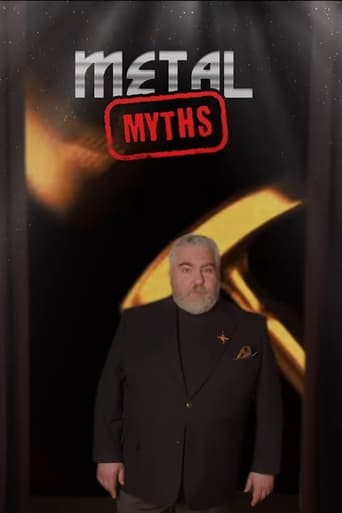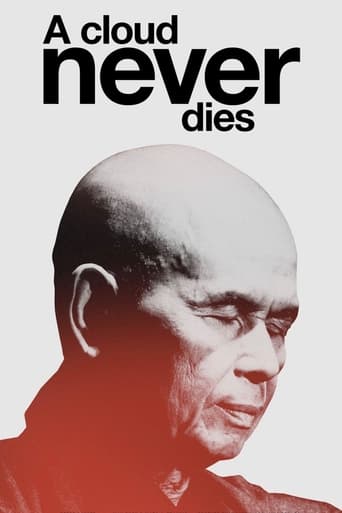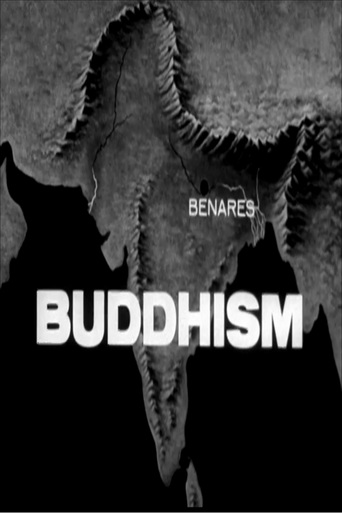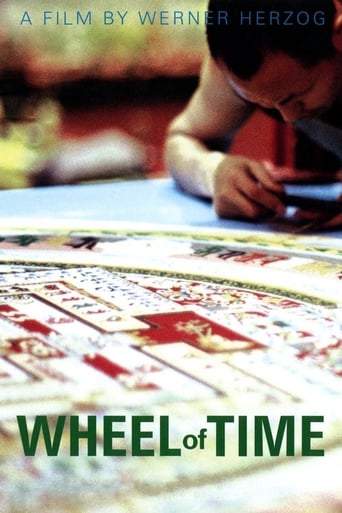
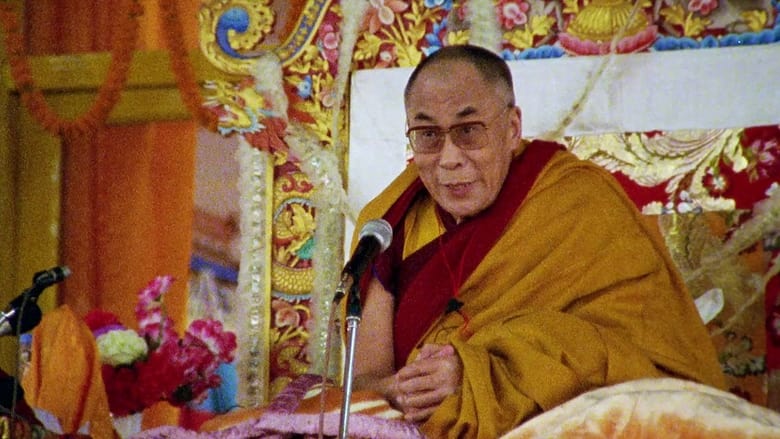
Wheel of Time (2003)
Wheel of Time is Werner Herzog's photographed look at the largest Buddhist ritual in Bodh Gaya, India.
Watch Trailer
Cast


Similar titles
Reviews
Werner Herzog's "Wheel of Time" watches as Tibetan Buddhist monks embark on a pilgrimage to Bodh Gaya, India. Once there, they create sand mandalas and engage in a series of elaborate rituals."Everyone is the centre of their own universe," the Dalai Lama tells Herzog. "Wheel of Time" itself seems to, at times, view its monks as being supremely self-centred and myopic. They engage in rituals, ceaseless prostrations, meditation and contemplation, rituals which Herzog devotes large chunks of his film to recording. The goal, we're told, is to achieve a "blissful acceptance of the illusory nature of self", but when does such self-cultivation become selfish and when does detachment from the self become but a dangerous denial of the self? The typical Buddhist argument is that only when we undergo "enough self-transformation" do we begin to see "larger realities beyond the importance of our own personal well-being". But this tends not to result in saintly bodhisattva, but something else entirely. To someone who sees himself and others as unreal, human suffering and death tends to appear laughably trivial."Wheel of Time's" last act delves into the persecution of Tibetans and Buddhists. Elsewhere the impermanence of sand mandalas are likened to the transient nature of all things; humans vanish like dust in the wind. The film climaxes with crowds of Buddhists trampling over one another for gifts, sweets and "blessings", actions which ironically counterpoint the many communal, sacrificial acts routinely committed by the monks.6/10 – Worth one viewing.
What is it about middle aged white mean and their sudden love of Orientalism (or jazz, for that matter)? Is it a midlife crisis? This thought came to me watching Werner Herzog's 2003 documentary Wheel Of Time. The best thing I can say of the film is that it would make for a solid PBS film by a typical documentary director, but coming from a master of cinema, like Herzog, it's a profound disappointment. Why? There simply is nothing more to this film than Herzog filming the mundane goings on at a trio of Buddhist festivals in 2002, and acting as if peasants trekking about a mountain (Mount Kailash in Tibet), monks painting mandalas with colored sand, and white Austrians rapt with Orientalism, were supposed to lend some deep insight into the cosmic goings on. At least, that is what can be taken from Herzog's narration of the film.Too often the film is hermetic; its rituals are regarded, but no explanation is proffered, not from an anthropological nor narrative perspective. The acts of prostration, as example, become mere sideshow carny acts to the watcher of this film, and never impart any sense of admiration for the devotees, because they are unreal, in many ways, never fully part of the vital reality of the film. Similarly, we see children in monk robes, yet Herzog never queries how such children really feel about being drafted into their family's business, something I once asked a young Buddhist monk. All in all, Wheel Of Time is a solid film, fairly straight forward, and nothing remotely approaching his earlier, greater films. Perhaps the most telling thing is that Werner Herzog made a merely solid film; that's how damned good a film craftsman he is. No, I'm wrong; even worse than making a solid film is the fact that the faux reverential Herzog mad a non-Herzogian film. Let's just hope Herzog is never smitten with John Coltrane nor Charlie Parker. That would not be merely solid, but brutally painful. Goodbye, Dalai!
"Each of us is truly the center of the universe"This is what is said by Dalia Lama, when he is asked about Mount Kailash, a mountain that is considered to be in the center of universe as per Buddhist & Hindu tradition.Wheel of time is a film which portrait traditional Buddhists initiation ceremony. Hundred thousand of pilgrimage gathers at Bodh-Gaya & Mount Kailash in India and also somewhere in Austria to perform spiritual duties. Herzog successfully portrays the insights of these individuals. Director depicted the insight of their faiths by interviewing them or just by using hollow background scores with penetrating camera angles.Herzog have his own surreal way of shooting landscapes, however don't expect much if you are a hard core Herzogian, but it is recommended.
Sure... Buddhism is hip... Sure the Western world has at times fixated on Buddhism in contrast to the violent tendencies of our Abrahamic religions... But let's be honest: Buddhism is boring! Oh, but the thought-provoking Buddhist quips!--as the Dalai Lama says in the film: the center of the universe is within each of us because our consciousness is the source of the idea of universe... now that truly is good stuff! But wait... what's this outside?!? Yes the camera pans through crowds of ascetics and poor people; people mystified by ritual, and desperately trying either to give meaning to or take meaning out of life. In blatant defiance to the tenderizing wisdom of Buddhist teachings stands the masses of followers that are clearly, disturbingly, mindlessly ritualized. No no no, not mindless in the good way, the "Buddhist" way. Mindless in the "I follow a religion way". Those in the West know this behavior very well...So there is no "real" Buddhism. THERE IS NO EXCITING BUDDHISM. There is only the Buddhist RELIGION. This film is in large part about the Buddhist religion...And Werner is the perfect director for such a task: stubborn and self-indulgent; brashly unapologetic about the "right to film-making". THIS is the inspiration for a camera that walks through a mass of people, then slowly fixates on one monk, and then with patience and audacity, sits there 6 inches from his face for 30 seconds! THIS is the background for Werner's classic comment after being told he is the center of the universe: "That feels good hearing that!--I shouldn't tell my wife..." This is as good as Buddhism gets! And all in all, if you can still tolerate the mind-numbing reality of Buddhism, then this film may be alright. Me? I'm waiting for Werner's next documentary: "A Day At Wal-Mart".


